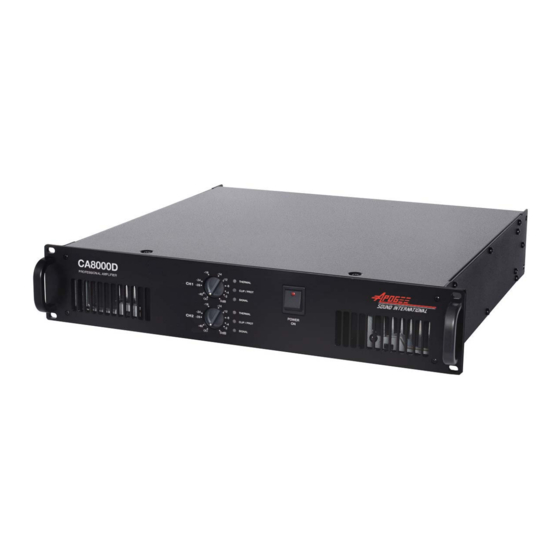Apogee Sound CA8000DXE Gebrauchsanweisung - Seite 7
Blättern Sie online oder laden Sie pdf Gebrauchsanweisung für Verstärken Apogee Sound CA8000DXE herunter. Apogee Sound CA8000DXE 16 Seiten. Professional amplifier
Auch für Apogee Sound CA8000DXE: Gebrauchsanweisung (16 seiten)

2.4 Auxillary Ground Lug
All CA8000D-Series amplifiers are equipped with a signal ground lug. This lug is NOT intended as a primary
AC power ground, which instead should be connected to the building ground by means of the power cord.
The ground lug is electrically tied to the chassis and can be useful as a means of reducing the chassis
ground impedance, thereby eliminating ground loops between devices when setting up a sound system.
One common practice is to tie together all the ground lugs of all devices that share a rack or housing, then
to make one point of connection between the ground wire and the signal ground. There are other methods
that can be effectively utilized, depending on the type of AC power distribution and other factors. Please
consult our Technical Department for more information. In all cases, we recommend the use of heavy gauge
wire (#14 AWG or larger) when auxiliary ground connections are utilized.
2.5 High Pass Filter
This filter cuts off frequency components below 25 Hz. When powering small and medium format speakers,
it is useful as an aid to reduce excessive cone excursion. Also, when the amplifier is powering 70v or 100v
constant voltage systems, it can be used to reduce the likelihood of saturating the step-up and step-down
transformers by removing excessive low frequency content. The filter may be switched ON and OFF via
internal jumpers, one per channel. Technically, the filter is an 18dB/octave Butterworth with a corner
frequency of 25 Hz (see Figure 5.3).
CAUTION: Changes to the HIGH PASS FILTER settings require that the cover of the amplifier
be removed, potentially exposing the user to hazardous voltages inside the amplifier. There-
fore, all configuration work must be performed by a qualified service technician
2.6 Anticlip Limiter Circuit
The CA8000D-Series amplifier employs ANTICLIP limiters as part of an active protection system designed to
help increase the lifespan of the loudspeakers. The ANTICLIP circuitry constantly analyses harmonic distortion
at the amplifier's output and automatically reduces the input level in order to not exceed a predetermined
distortion index. CA8000D/E amplifiers are delivered with the ANTICLIP system set to a threshold of 1% THD
(Total Harmonic Distortion) which we refer to as 'hard limiting'. However, this value can be switched to a 'soft
limiter' that permits a max. of 5% THD. Each channel may be set to either soft or hard limiting, independently via
internal jumpers (see Figure 5.3).
CAUTION: Changes to the ANTICLIP settings require that the cover of the amplifier be removed,
potentially exposing the user to hazardous voltages inside the amplifier. Therefore, all
configuration work must be performed by a qualified service technician.
2.7 Output Connections
The OUTPUT section on the rear panel features Speakon connectors.
Whenever you need to operate the amplifier in BRIDGED mode, you must set the "STEREO/BRIDGE"
Switch to BRIDGE. The input signal is taken from the CHANNEL 1 connector and the signal output to the
loudspeaker is on pins 1+ and 2+ of the Speakon connector "OUTPUT1".
ATTENTION: Terminals 1+, 1- and 2+, 2- must only be used in STEREO operation and terminals 1+, 2+ in
BRIDGED operation. Other combinations would lead to poor output quality. Please make sure that the
resulting impedance of your installation, when the amplifier is operating in BRIDGE mode, is never lower
than 4 Ohm (8 Ohm recommended).
In all cases, the connection cable that joins the amplifier and the loudspeaker should be heavy gauge, high-
quality wire, kept as short as possible. We advise using a wire gauge of at least #14 AWG for lengths of
50 feet. For longer runs (over 50 ft.) the wire gauge should be increased to #12 AWG or larger. Ideally, multi-
stranded, oxygen-free copper cable is recommended for best results.
2. Installation
3
